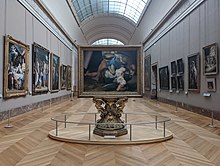Double-sided painting
Appearance


A double-sided painting is a canvas which has a painting on either side. Historically, artists would often paint on both sides out of need of material.[citation needed] The subject matter of the two paintings was sometimes, although not normally, related.
Restoring and displaying double-sided paintings can pose additional challenges for museums and galleries. When repairing canvases, restorers must ensure that their restoration efforts do not damage the image on either side. They must also use stretcher bars that do not obscure either side of the image, and they cannot use crossbars to help keep tension.[1]
List of double-sided paintings
[edit]- David and Goliath by Daniele da Volterra[2]
- Portrait of the Dwarf Nano Morgante by Bronzino[3]
References
[edit]- ^ Iurovetskaia, Elena; Yurovetskaya, Anastasia; Churakova, Maria; Romanov, Artyom (2023). "The Challenges of Treating and Displaying Two-Sided Oil Paintings". Conserving Canvas. Getty Publications. pp. 424–427. ISBN 978-1-60606-824-3. Retrieved 3 February 2024.
- ^ Sueur, Hélène (2003). The little book of Michelangelo. Paris: Flammarion. pp. 115–116. ISBN 2-0801-1159-0.
- ^ Parker, Deborah (2000). Bronzino: Renaissance Painter as Poet (2010 Paperback ed.). New York: Cambridge University Press. p. 155. ISBN 978-0-521-17853-2.
